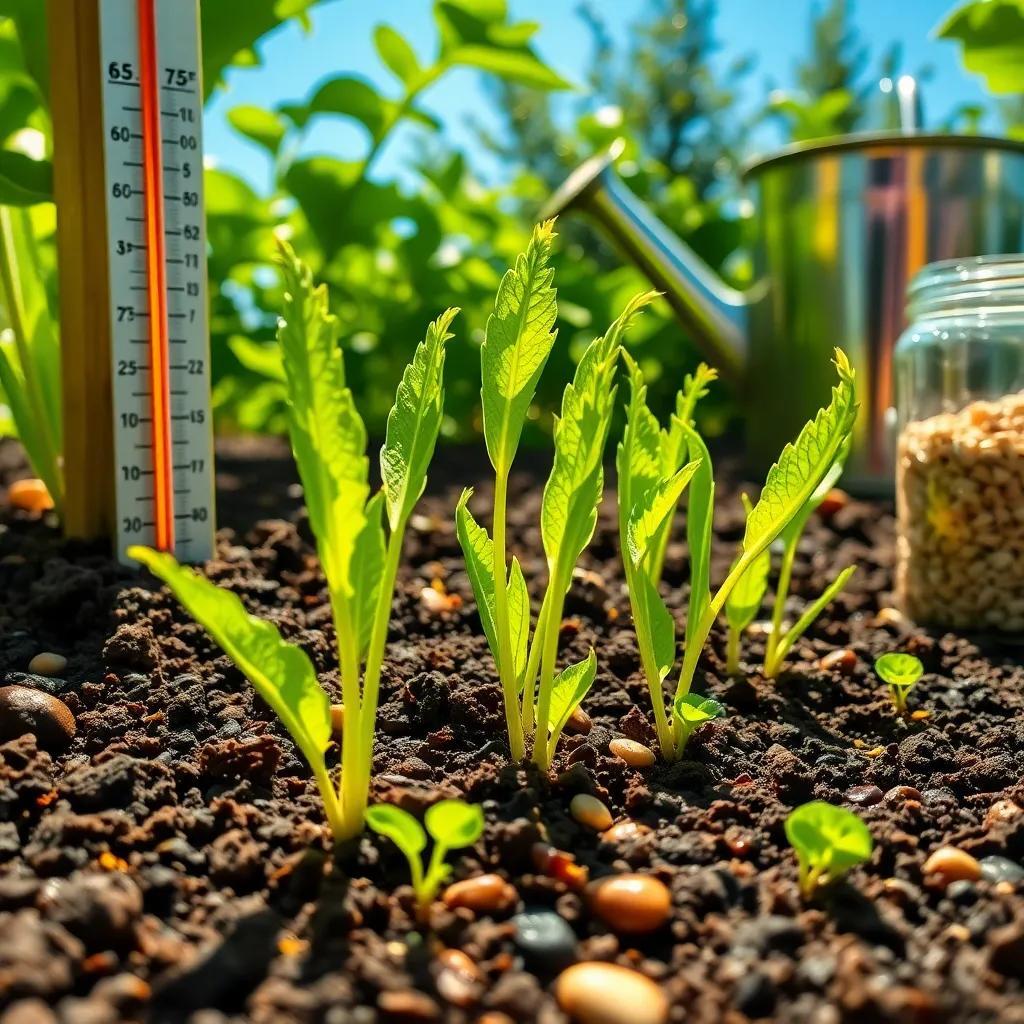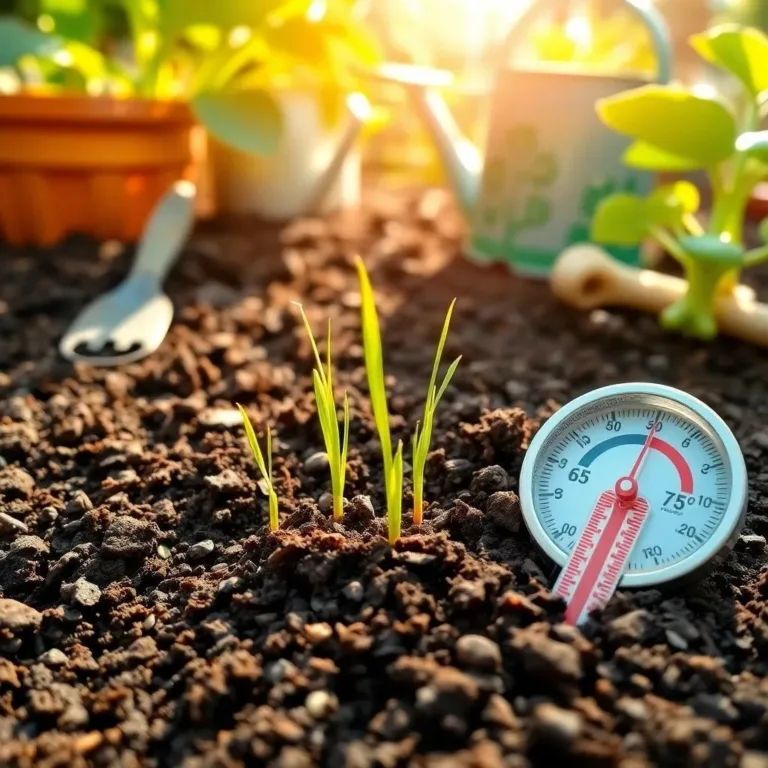Are you ready to watch some tiny seeds work their magic? Growing alfalfa can be a fun and rewarding experience, and understanding how to help them germinate is the first step! Join me as we explore the ins and outs of alfalfa seed germination, from what influences their growth to the best techniques for success. Let’s dig in together!
Factors Influencing Alfalfa Seed Germination Time
When it comes to germinating alfalfa seeds, several factors play a significant role in how quickly those little seeds sprout! Understanding these can really make a difference in your gardening journey. Let’s break down the key influences that can affect germination time:
- Temperature: This is probably one of the most important factors. Alfalfa seeds thrive in a temperature range of 65 to 75°F (18 to 24°C). If it’s too cool, the seeds might take their sweet time to sprout. If it’s too hot, they might just give up!
- Moisture: Seeds need consistent moisture to germinate, but there’s a fine line! Overwatering can lead to problems like seed rot, while lack of moisture can cause the seeds to stay dormant. Keeping the soil consistently moist (but not soggy) is the goal here.
- Soil Quality: Alfalfa seeds prefer well-draining soil. Soil that’s too compacted can suffocate the seeds and slow down their growth. A blend of organic matter can help create a cozy home for your seeds!
- Light: Believe it or not, these seeds like to be in the dark when they’re germinating. Planting them at a depth of about 1/4 to 1/2 inch (0.6 to 1.3 cm) under the soil surface helps them get that cozy darkness they crave.
- Seed Quality: Lastly, don’t forget to use fresh, high-quality seeds. Old or low-quality seeds might not germinate at all, which can be disappointing after all the effort you’ve put in!
By paying attention to these factors and adjusting them to meet your alfalfa seeds’ needs, you’ll be on your way to a thriving garden! Isn’t gardening fun?
Creating Optimal Conditions for Alfalfa Germination
So, now that we know what influences germination, let’s talk about how to create the perfect conditions for those alfalfa seeds to thrive! Think of it like preparing a cozy little nest for a bird. Here’s what to keep in mind:
- Temperature: Aim for that sweet spot of 65 to 75°F. If the weather outside is unpredictable, consider using a seed mat or placing your pots in a warm spot to keep those temperatures just right!
- Moisture: Start by soaking your seeds for about 12 hours before planting—this is like an energy drink for them! After planting, make it a routine to gently water the seeds, keeping the soil damp but not soggy. You can use a spray bottle for a light misting if needed!
- Soil Preparation: Before planting, loosen the soil to make it nice and fluffy. Mix in some compost or organic matter—these nutrients will help your alfalfa grow strong and healthy!
- Light/Darkness: Remember, these seeds want to stay in the dark! Keep them covered lightly with soil, and once they’ve sprouted, expose them to sunlight gradually to avoid shocking them.
- Protection: Watch out for pesky critters like birds or insects! You might want to cover your planting area with some netting until your seedlings are stronger.
Keep in mind, creating these conditions is like giving your alfalfa seeds a head start! With a little effort and care, you’ll soon be enjoying a lush crop of alfalfa. Happy gardening!

Expected Germination Timeline for Alfalfa Seeds
Now, let’s talk about the expected timeline for your alfalfa seeds to germinate! I always find it exciting to watch seeds sprout, and knowing what to expect can keep the anticipation at a fun level. On average, alfalfa seeds usually germinate in about 7 to 10 days when they’re in the right conditions. Isn’t that amazing?
However, don’t be surprised if it takes a little longer sometimes. It can stretch to 14 days or more, especially if the temperature dips or the soil isn’t just right. Here’s a quick breakdown of what influences this timeline:
- Ideal Conditions: When the temperature is around 70 to 85°F (21 to 29°C) and the soil remains consistently moist, the seeds are likely to sprout faster. Aim for that perfect balance!
- Seed Quality: If you start with high-quality seeds, you’re bound to see better results. Fresh seeds typically germinate quicker than older, less viable ones.
- External Factors: Things like sudden weather changes can impact germination. Keeping an eye on the conditions will help!
Remember, gardening is all about patience! I often check on my seedlings daily, and sometimes, I see a few little green shoots peeking through the soil! That moment is pure magic. So, give your seeds time and care, and soon you’ll be enjoying a beautiful crop of alfalfa!
Techniques to Enhance Alfalfa Seed Germination
Now that we’ve covered the timeline, let’s dive into some effective techniques that can help boost the germination of alfalfa seeds. These ideas are simple, yet they can work wonders for your garden!
- Priming: This technique is like giving your seeds a little pep talk! Soak the seeds in water for about 12 hours before planting. This helps break dormancy and can speed things up!
- Proper Depth: Plant those seeds at a depth of 1/4 to 1/2 inch (0.6 to 1.3 cm). This depth allows them to enjoy the darkness they crave, while still getting the right moisture.
- Consistent Watering: One of the best tips I’ve picked up is to keep the soil consistently moist. I like to mist the seeds gently, especially if the top layer starts to dry out. Just be careful not to overdo it!
- Temperature Control: If possible, try to start your seeds indoors or in a protected area where you can control the temperature. Remember, alfalfa loves warmth!
- Weed Management: Weeds can be sneaky little devils! Remove any weeds before planting and keep the area clean to give your alfalfa seeds all the nutrients they need.
- Pest Protection: Keep an eye out for birds or other pests that might want to snack on your seeds. A lightweight protective barrier can fend them off until your seeds germinate.
By using these techniques, you’ll set the stage for your alfalfa seeds to thrive! Gardening should be a joyful and rewarding experience, so roll up your sleeves and get ready to nurture your crops!
Common Questions About Alfalfa Germination
Gardening can come with many questions, and alfalfa germination is no exception! I’ve gathered some common questions that many beginners (and even some pros!) often ask. Let’s tackle these FAQs together!
Q: What is the best time to plant alfalfa seeds?
A: Ideally, you want to plant them in the spring or early fall when temperatures are mild. Avoid extreme heat or frost to give your seeds the best shot!
Q: How often should I water my seeds during germination?
A: It’s best to keep the soil consistently moist. Water them gently every few days, or even daily, if it’s especially warm or windy out. Just remember, no drowning!
Q: Do alfalfa seeds need sunlight to germinate?
A: Surprisingly, no! They actually prefer darkness for germination. Once they sprout, they’ll need sunlight to grow strong, but keep them covered initially.
Q: Can I reuse alfalfa seeds?
A: You can, but it’s essential to check their viability first. Older seeds may not germinate as well, so a quick test can save you time and effort!
Q: What should I do if my seeds aren’t germinating?
A: Reassess the conditions! Check the temperature, moisture levels, and if the seeds were of good quality. Sometimes a little adjustment can make a big difference.
These FAQs highlight that knowing more about alfalfa germination can boost your confidence as a gardener! I hope this helps you feel ready to grow your own alfalfa crop. Happy gardening!

